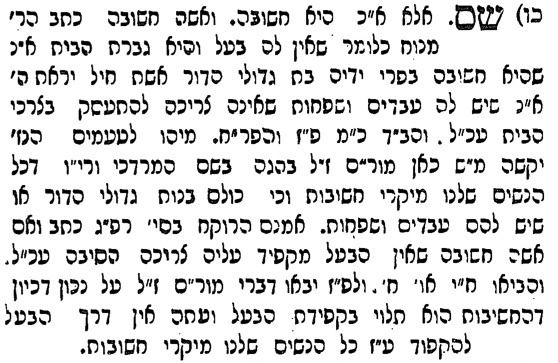The Mitzvah of recalling the Exodus everyday
(א) שָׁמוֹר֙ אֶת־חֹ֣דֶשׁ הָאָבִ֔יב וְעָשִׂ֣יתָ פֶּ֔סַח לַיהוָ֖ה אֱלֹהֶ֑יךָ כִּ֞י בְּחֹ֣דֶשׁ הָֽאָבִ֗יב הוֹצִ֨יאֲךָ֜ יְהוָ֧ה אֱלֹהֶ֛יךָ מִמִּצְרַ֖יִם לָֽיְלָה׃ (ב) וְזָבַ֥חְתָּ פֶּ֛סַח לַיהוָ֥ה אֱלֹהֶ֖יךָ צֹ֣אן וּבָקָ֑ר בַּמָּקוֹם֙ אֲשֶׁר־יִבְחַ֣ר יְהוָ֔ה לְשַׁכֵּ֥ן שְׁמ֖וֹ שָֽׁם׃ (ג) לֹא־תֹאכַ֤ל עָלָיו֙ חָמֵ֔ץ שִׁבְעַ֥ת יָמִ֛ים תֹּֽאכַל־עָלָ֥יו מַצּ֖וֹת לֶ֣חֶם עֹ֑נִי כִּ֣י בְחִפָּז֗וֹן יָצָ֙אתָ֙ מֵאֶ֣רֶץ מִצְרַ֔יִם לְמַ֣עַן תִּזְכֹּר֔ אֶת־י֤וֹם צֵֽאתְךָ֙ מֵאֶ֣רֶץ מִצְרַ֔יִם כֹּ֖ל יְמֵ֥י חַיֶּֽיךָ׃
(1) Observe the month of Abib, and keep the passover unto the LORD thy God; for in the month of Abib the LORD thy God brought thee forth out of Egypt by night. (2) And thou shalt sacrifice the passover-offering unto the LORD thy God, of the flock and the herd, in the place which the LORD shall choose to cause His name to dwell there. (3) Thou shalt eat no leavened bread with it; seven days shalt thou eat unleavened bread therewith, even the bread of affliction; for in haste didst thou come forth out of the land of Egypt; that thou mayest remember the day when thou camest forth out of the land of Egypt all the days of thy life.
אע"פ שאין מצות ציצית נוהגת בלילה קוראין אותה בלילה מפני שיש בה זכרון יציאת מצרים ומצוה להזכיר יציאת מצרים ביום ובלילה שנאמר למען תזכור את יום צאתך מארץ מצרים כל ימי חייך וקריאת שלש פרשיות אלו על סדר זה היא הנקראת קריאת שמע.
Even though the commandment of wearing fringes does not apply at night, one reads the passage [concerning it] because it has a reminder of the Exodus from Egypt. It is a commandment to recite the Exodus from Egypt as it is stated, "So that you will remember the Exodus from Egypt all the days of your life" (Deuteronomy 16:3). These three sections ordered as such form the recitation of the Shema.
The Mitzvah of Retelling the Exodus Story on Pesach Night
(ח) וְהִגַּדְתָּ֣ לְבִנְךָ֔ בַּיּ֥וֹם הַה֖וּא לֵאמֹ֑ר בַּעֲב֣וּר זֶ֗ה עָשָׂ֤ה יְהוָה֙ לִ֔י בְּצֵאתִ֖י מִמִּצְרָֽיִם׃
(8) And thou shalt tell thy son in that day, saying: It is because of that which the LORD did for me when I came forth out of Egypt.
ואמר רבי יהושע בן לוי: נשים חייבות בארבעה כוסות הללו, שאף הן היו באותו הנס.
"Rabbi Yehoshua ben Levi said: Women are obligated in these four cups [of wine on Pesach eve], for they, too, were included in that miracle."
(ז) כל מצות הבן על האב אנשים חיבין ונשים פטורות, וכל מצות האב על הבן אחד אנשים ואחד נשים חיבין, וכל מצות עשה שהזמן גרמה אנשים חיבין ונשים פטורות, וכל מצות עשה שלא הזמן גרמה אחד אנשים ואחד נשים חיבין, וכל מצות לא תעשה בין שהזמן גרמה בין שלא הזמן גרמה אחד אנשים ואחד נשים חיבין, חוץ מבל תשחית ובל תקיף ובל תטמא למתים.
(7) [With regard to] all commandments of the son which are [incumbent] upon the father, men are obligated, and women are exempt. And [with regard to] all commandments of the father which are [incumbent] upon the son, both men and women are obligated. And [with regard to] every positive commandment that is time-dependent, men are obligated and women are exempt. And [with regard to] every positive commandment which is not time-dependent, both men and women are obligated. And [with regard to] every negative commandment, whether it is time-dependent or it is not time-dependent, both men and women are obligated, except for: "You shall not round off [the corners of your head]" (Leviticus 19:27), "You shall not destroy [the corners of your beard]" (ibid.), and "You shall not become ritually impure for the dead" (Leviticus 21:1).
שאף הן היו באותו הנס - כדאמרינן (סוטה יא, ב) בשכר נשים צדקניות שבאותו הדור נגאלו, וכן גבי מקרא מגילה, נמי אמרינן הכי, דמשוםדעל ידי אסתר נגאלו, וכן גבי נר חנוכה במסכת שבת (כג, א).
Rashi / Rashbam - Pesachim 108
"As it says (Sota 11b): In the merit of the righteous women of that generation they were redeemed. This is also said regarding Megilla reading, for they were redeemed through Ester, and also regarding Chanuka candles, in Masekhet Shabbat (23a)."
(א) מצות ספור יציאת מצרים - לספר בענין יציאת מצרים בליל ט''ו בניסן, כל אחד כפי צחות לשונו, ולהלל ולשבח לשם יתברך על כל הנסים שעשה לנו שם. שנאמר (שמות יג ח) והגדת לבנך. וכבר פרשו חכמים, (מכילתא בא שם) דמצות הגדה זו הוא בליל ט''ו בניסן בשעת אכילת מצה. ומה שאמר הכתוב לבנך, לאו דוקא בנו, (פסחים קטז, א) אלא אפילו עם כל בריה.
(ב) וענין המצוה, שיזכר הנסים והענינים שארעו לאבותינו ביציאת מצרים, ואיך לקח האל יתברך נקמתנו מהם, ואפילו בינו, לבין עצמו, אם אין שם אחרים, חיב להוציא הדברים מפיו, כדי שיתעורר לבו בדבר, כי בדבור יתעורר הלב (עי' סהמ''צ להרמב''ם מ''ע קנז).
(ה) ונוהגת בזכרים ונקבות (פסחים לו, א קטו, ב) בכל מקום ובכל זמן. והעובר עליה, בטל עשה.
(יד) גַּם הַנָּשִׁים חַיָּבוֹת בְּאַרְבַּע כּוֹסוֹת וּבְכָל מִצְוֹת הַנּוֹהֲגוֹת בְּאוֹתוֹ לַיְלָה.
(מה) מצות הנוהגות וכו' - כגון מצה ומרור ואמירת הגדה:
(ד) אִשָּׁה אֵינָהּ צְרִיכָה הֲסַבָּה אֶלָּא אִם כֵּן הִיא חֲשׁוּבָה. הַגָּה: וְכָל הַנָּשִׁים שֶׁלָּנוּ מִקְרֵי חֲשׁוּבוֹת (מָרְדְּכַי רֵישׁ פ' ע''פ וְרַבֵּנוּ יְרוּחָם), אַךְ לֹא נָהֲגוּ לְהָסֵב כִּי סָמְכוּ עַל דִּבְרֵי ראבי''ה דְּכָתַב דְּבַזְּמַן הַזֶּה אֵין לְהָסֵב (דִּבְרֵי עַצְמוֹ).
Kaf Hachaim - Yaakov Chaim Sofer (1870–1939) - Baghdad





